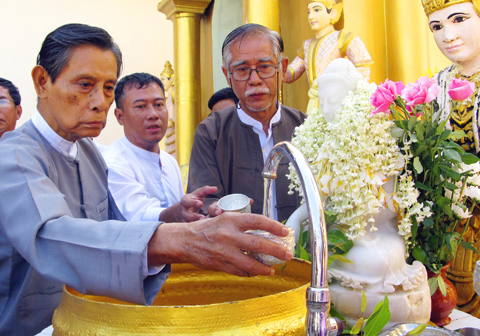Aung San Suu Kyi’s deputy urged Myanmar’s ruling junta yesterday to engage the opposition in dialogue before elections this year, as he took his first steps outside as a free man in seven years.
Tin Oo, 83, vice chairman of Aung San Suu Kyi’s National League for Democracy (NLD), made the appeal as he prayed at Yangon’s famed Shwedagon Pagoda following his release from house arrest late on Saturday.
“Because I am a Buddhist I came here to wish for peace for all Myanmar people,” he said as he toured the huge golden monument, accompanied by his wife and a dozen NLD officials who held umbrellas to protect him from the sun.

PHOTO: AP
“My feeling now is that I wish to find a way through successful dialogue that the whole country can live unitedly and peacefully,” he said.
However, he said his own release means nothing if Nobel Peace laureate Aung San Suu Kyi, 64, and some 2,100 other political prisoners are still detained when the elections take place.
Tin Oo had been held since 2003, when he and Aung San Suu Kyi were arrested after a pro-junta mob attacked their motorcade during a political tour, killing 70 people.
He was a former army general and defense minister who was forced into retirement in the 1970s after falling foul of the country’s military rulers. He was in trouble again in the 1990s because of his involvement with the NLD.
“How can I be glad [that I am free] when there are so many who have been sentenced to life imprisonment? It is not enough to release me alone,” Tin Oo said.
“All people will be happy if all things can be discussed and a solution can be reached,” he said.
He said on Saturday that the government had warned him not to take actions that could “disturb the building of the state” but that he would continue his political activities and visit the offices of the NLD today.
Tin Oo’s release comes with the UN human rights envoy for Myanmar, Tomas Ojea Quintana, due to visit the country today to examine its progress.

Taiwan is gearing up to celebrate the New Year at events across the country, headlined by the annual countdown and Taipei 101 fireworks display at midnight. Many of the events are to be livesteamed online. See below for lineups and links: Taipei Taipei’s New Year’s Party 2026 is to begin at 7pm and run until 1am, with the theme “Sailing to the Future.” South Korean girl group KARA is headlining the concert at Taipei City Hall Plaza, with additional performances by Amber An (安心亞), Nick Chou (周湯豪), hip-hop trio Nine One One (玖壹壹), Bii (畢書盡), girl group Genblue (幻藍小熊) and more. The festivities are to

Auckland rang in 2026 with a downtown fireworks display launched from New Zealand’s tallest structure, Sky Tower, making it the first major city to greet the new year at a celebration dampened by rain, while crowds in Taipei braved the elements to watch Taipei 101’s display. South Pacific countries are the first to bid farewell to 2025. Clocks struck midnight in Auckland, with a population of 1.7 million, 18 hours before the famous ball was to drop in New York’s Times Square. The five-minute display involved 3,500 fireworks launched from the 240m Sky Tower. Smaller community events were canceled across New Zealand’s

‘IRRESPONSIBLE’: Beijing’s constant disruption of the ‘status quo’ in the Taiwan Strait has damaged peace, stability and security in the Indo-Pacific region, MOFA said The Presidential Office yesterday condemned China’s launch of another military drill around Taiwan, saying such actions are a “unilateral provocation” that destabilizes regional peace and stability. China should immediately stop the irresponsible and provocative actions, Presidential Office spokeswoman Karen Kuo (郭雅慧) said, after the Chinese People’s Liberation Army (PLA) yesterday announced the start of a new round of joint exercises around Taiwan by the army, navy and air force, which it said were approaching “from different directions.” Code-named “Justice Mission 2025,” the exercises would be conducted in the Taiwan Strait and in areas north, southwest, southeast and east of Taiwan

UNDER WAY: The contract for advanced sensor systems would be fulfilled in Florida, and is expected to be completed by June 2031, the Pentagon said Lockheed Martin has been given a contract involving foreign military sales to Taiwan to meet what Washington calls “an urgent operational need” of Taiwan’s air force, the Pentagon said on Wednesday. The contract has a ceiling value of US$328.5 million, with US$157.3 million in foreign military sales funds obligated at the time of award, the Pentagon said in a statement. “This contract provides for the procurement and delivery of 55 Infrared Search and Track Legion Enhanced Sensor Pods, processors, pod containers and processor containers required to meet the urgent operational need of the Taiwan air force,” it said. The contract’s work would be